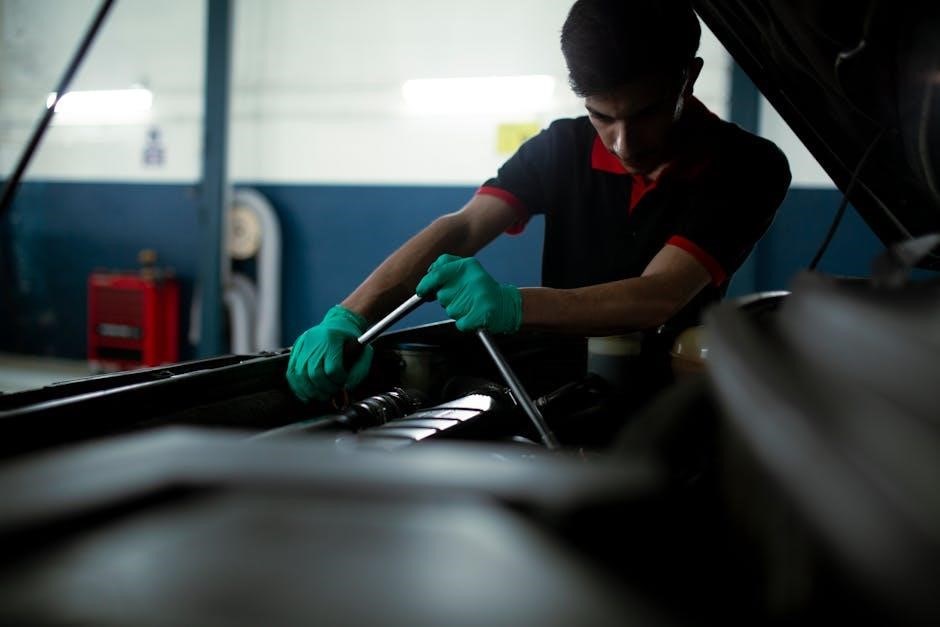The Mercedes B7 Service Checklist is a comprehensive guide ensuring optimal vehicle performance and longevity. It outlines essential maintenance tasks, intervals, and inspections for Mercedes owners.
1.1 Importance of Regular Maintenance for Mercedes Vehicles
Regular maintenance is crucial for preserving the performance, safety, and longevity of Mercedes vehicles. It helps prevent minor issues from escalating into major repairs, ensuring reliability and optimal functionality. By adhering to the B7 Service Checklist, owners can maintain their vehicle’s advanced engineering standards, enhance fuel efficiency, and prevent unexpected breakdowns. Consistent upkeep also supports the vehicle’s resale value and overall driving experience, making it a vital investment for Mercedes owners who prioritize quality and durability.
1.2 Overview of the B7 Service Checklist

The B7 Service Checklist is a detailed schedule designed to ensure Mercedes vehicles receive the necessary care to maintain peak performance. It outlines specific tasks and inspections tailored to the vehicle’s needs at various mileage intervals. The checklist covers oil and filter changes, tire rotations, brake evaluations, and fluid level checks, among other essential services. By following this structured approach, owners can address potential issues early, ensuring reliability, safety, and optimal functionality of their Mercedes vehicle over time.

Key Service Intervals for Mercedes B7
Mercedes B7 service intervals are designed to ensure optimal vehicle performance and longevity. Regular maintenance is recommended at specific mileage and time-based markers to prevent issues.

2.1 Recommended Mileage Intervals for B7 Service
The Mercedes B7 service is typically recommended at specific mileage intervals to ensure optimal performance. These intervals are designed to catch potential issues early, preventing more severe problems down the road. Regular checks at these milestones help maintain the vehicle’s efficiency and reliability. By adhering to these intervals, owners can enjoy a smoother driving experience and prolong the life of their Mercedes.
2.2 Time-Based Service Requirements
Mercedes B7 service also follows a time-based schedule to ensure reliability and performance. Key services include oil and filter changes every 15,000 to 30,000 miles, depending on driving conditions. Brake fluid replacement is recommended every 2 years, while battery and electrical system checks are advised annually. Additionally, inspections of belts, hoses, and suspension components are time-sensitive. Adhering to these intervals helps prevent unexpected repairs and maintains the vehicle’s overall health. Regular time-based maintenance ensures your Mercedes runs efficiently and safely over time.
Essential Maintenance Tasks in the B7 Checklist
The B7 Checklist includes oil and filter changes, tire inspections, brake evaluations, and fluid checks. Regular inspections ensure optimal performance, safety, and longevity of your Mercedes vehicle.
3.1 Oil and Filter Change Procedures
Oil and filter changes are critical for maintaining your Mercedes’ engine health. The B7 Service Checklist recommends replacing the oil filter every 20,000 to 60,000 miles, depending on driving conditions. Use synthetic oil for optimal performance. Always drain the old oil safely and install a new filter to prevent leaks. Refill with the recommended synthetic oil grade to ensure proper engine protection and efficiency. Resetting the service indicator after completion ensures accurate tracking of future maintenance needs. Always refer to your owner’s manual for specific guidelines tailored to your vehicle.
3.2 Tire Inspection and Rotation Guidelines
Regular tire inspections are vital for safety and performance. Check tire pressure monthly and before long trips, using the recommended levels from your owner’s manual. Rotate tires every 5,000 to 8,000 miles to ensure even wear. Inspect for uneven wear, cracks, or damage, and replace tires if tread depth is below 1/16 of an inch. Use the penny test for quick tread checks. Ensure valve stem caps are secure, and tighten lug nuts properly after rotation. Always refer to your Mercedes B7 service checklist for specific rotation patterns and maintenance intervals.

Diagnostic Checks for Mercedes B7
Advanced diagnostic checks ensure Mercedes B7 systems function optimally. These evaluations identify potential issues early, preventing major repairs and maintaining performance, safety, and reliability over time.

4.1 OBD-II System Scanning and Analysis
OBD-II system scanning is a critical diagnostic step for Mercedes B7 maintenance. This process involves connecting an OBD-II reader to the vehicle’s onboard computer to retrieve error codes, monitor emissions performance, and assess engine health. By analyzing real-time data, technicians can identify issues early, ensuring prompt repairs and preventing costly damage. Regular OBD-II checks help maintain optimal engine efficiency, reduce emissions, and enhance overall vehicle performance, making it a cornerstone of the B7 service checklist.
4.2 Battery and Electrical System Testing
Battery and electrical system testing are vital for ensuring reliable performance in your Mercedes B7. Technicians inspect the battery for corrosion, test voltage levels, and check the charging system’s functionality. They also verify that all electrical components, such as lights and sensors, are operating correctly. This thorough evaluation helps prevent unexpected breakdowns and ensures the electrical system supports advanced features like infotainment and driver-assistance systems. Regular testing maintains electrical integrity and enhances overall vehicle reliability, aligning with the B7 service checklist’s rigorous standards.

Safety Inspections in the B7 Service
Safety inspections in the B7 service involve evaluating critical components like brakes and suspension to ensure driving safety and reliability. Early issue detection prevents breakdowns and enhances performance.
5.1 Brake System Evaluation and Replacement
The brake system evaluation ensures safety by inspecting pads, rotors, and fluid levels. Worn pads or warped rotors are replaced to maintain stopping efficiency. Brake fluid is checked for contamination and topped off as needed. Proper brake function is critical for preventing accidents, especially in Mercedes vehicles known for their advanced safety features. Regular inspections help avoid costly repairs and ensure reliable braking performance under all driving conditions. This step is vital for maintaining the overall safety and integrity of the vehicle.
5.2 Suspension and Steering Component Checks
The suspension and steering system are evaluated to ensure stability and control. Inspections include checking shock absorbers, struts, and ball joints for wear. Proper alignment is verified to prevent uneven tire wear. Lubrication of steering components and inspection of tie rods and bushings are performed. Any damage or excessive play in these parts is addressed to maintain precise handling and ride comfort. Regular checks help prevent issues that could compromise safety or lead to costly repairs down the line.

Engine Performance and Maintenance
Regular engine maintenance ensures optimal performance and longevity. This includes spark plug replacement, air filter checks, and inspecting belts and hoses for wear or damage.
6.1 Spark Plug Replacement and Inspection
Spark plug replacement is crucial for maintaining engine efficiency. Worn-out plugs can lead to poor fuel economy and reduced performance. Mercedes recommends replacing them every 30,000 to 50,000 miles. During inspection, technicians check for signs of wear, fouling, or damage. Proper gapping and tightening ensure optimal ignition. Neglecting spark plugs can cause misfires, lowering engine power and increasing emissions. Regular checks and replacements are vital for smooth engine operation and preventing costly repairs down the line. Always use genuine parts for reliability.
6.2 Air Filter Cleaning and Replacement
Air filter cleaning and replacement are vital for ensuring proper engine airflow and performance. Mercedes recommends replacing the air filter every 15,000 to 30,000 miles, depending on driving conditions. A dirty air filter can reduce fuel efficiency, lower horsepower, and increase emissions. During the B7 service, technicians inspect the air filter for dust, debris, or damage. Cleaning or replacing it ensures optimal engine breathing and combustion efficiency. Using genuine Mercedes parts guarantees compatibility and maintains the vehicle’s performance standards. Regular air filter maintenance is essential for long-term engine health.
Fluid Checks and Replenishment
Regular fluid checks are crucial for maintaining your Mercedes’ performance. Coolant, transmission, and brake fluids are inspected for levels and condition. Top-ups or replacements ensure optimal functionality.
7.1 Coolant, Transmission, and Brake Fluid Levels
Checking coolant, transmission, and brake fluid levels is vital for your Mercedes’ health. Coolant ensures proper engine temperature, transmission fluid maintains smooth gear shifts, and brake fluid is critical for stopping power. During B7 service, each fluid is inspected for quantity and condition. Low levels are topped up, and contaminated fluids are replaced to prevent system damage. Adhering to these checks ensures safety and optimal vehicle performance, aligning with Mercedes’ high standards for reliability and durability. Regular maintenance here prevents costly repairs and enhances overall driving experience.
7.2 Windshield Washer and Power Steering Fluid Checks
Inspecting windshield washer and power steering fluid levels is crucial for visibility and smooth steering. During B7 service, technicians check for adequate fluid levels and signs of contamination or leaks. Windshield washer fluid ensures clear vision, while power steering fluid maintains effortless steering control. Low levels are replenished, and degraded fluids are replaced to prevent system malfunctions. Regular checks ensure safe driving conditions and maintain the Mercedes’ precise handling and performance capabilities, aligning with its reputation for reliability and driver comfort. Proper fluid maintenance is essential for long-term vehicle health. Always use approved fluids to avoid damage. Visibility and steering precision are paramount.
Adhering to the Mercedes B7 Service Checklist ensures optimal vehicle performance, safety, and longevity. Regular maintenance prevents issues, enhances reliability, and maintains your car’s value over time.

8.1 Summary of the B7 Service Checklist
The Mercedes B7 Service Checklist is a detailed maintenance guide designed to ensure optimal performance and longevity of your vehicle. It covers essential tasks such as oil and filter changes, tire inspections, and diagnostic checks. Regular intervals, both mileage and time-based, are outlined to prevent potential issues. The checklist also includes safety inspections, fluid checks, and engine performance evaluations. By following this schedule, owners can maintain their car’s reliability, safety, and value, ensuring a smooth driving experience for years to come.
8.2 Benefits of Following the Service Schedule
Adhering to the B7 Service Checklist ensures optimal vehicle performance, reliability, and longevity. Regular maintenance prevents potential issues, reducing repair costs and extending the life of your Mercedes. It enhances safety by identifying and addressing wear and tear early. Additionally, following the schedule maintains your car’s value and ensures compliance with manufacturer guidelines. This consistent care also improves fuel efficiency and overall driving experience, providing peace of mind for years of trouble-free ownership.
